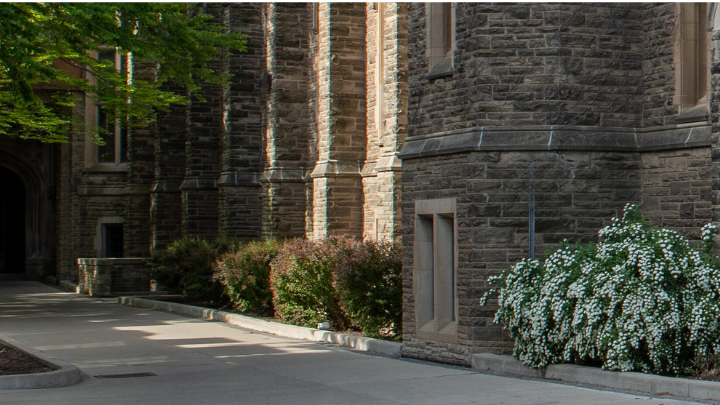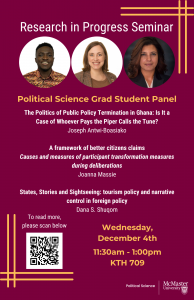RIPs: Graduate Student Panel
Dec 4, 2024
11:30AM to 1:00PM
1280 Main St W, Hamilton, Canada

Date/Time
Date(s) - 04/12/2024
11:30 am - 1:00 pm
Location
KTH 709
Political Science | Fall 2024 RIPS Seminar Series
Research in Progress Seminar hosted by the Department of Political Science presents:
Graduate Student Panel
DATE: Wednesday, December 4th, 2024
TIME: 11:30 a.m. – 1:00 p.m. EST
WHERE: KTH 709
This seminar welcomes Graduate Students from the Department of Political Science.
A framework of better citizens claims
Causes and measures of participant transformation measures during deliberations
Joanna Massie
This article offers a critical examination of theoretical and empirical claims about the effect of deliberative processes on participants. Advocates of deliberative processes claim that they have transformative potential for citizens: increasing their knowledge of issues, refining their own opinions, and fostering civic engagement. Drawing on previous operationalizations, this paper proposes a new typology for measuring claims of ‘better citizens’ through deliberation, or participant transformation measures: opinion change, increased capability, and increased efficacy. This paper further explores the external causes of such changes to citizens: expert evidence, learning from other participants, and reason-giving. Finally, this paper reflects on the omissions in existing empirical analysis and provides direction for scholars seeking to measure the effects of deliberative processes on citizens.
States, Stories and Sightseeing: tourism policy and narrative control in foreign policy
Dana S. Shuqom
This interdisciplinary research explores the possibility of the use of tourism policy as a tool of foreign policy. By examining the case study of Saudi Arabia, it shows how a state’s tourism policy could perform similar functions as public diplomacy, allowing a state to address foreign publics. The dissertation proposes a new model, ‘The Narrative Control Mechanism’, to summarize how this is done. The research combines elements from international relations and foreign policy analysis; tourism; and communications. It draws on literature on ‘Informal Diplomacies’ and contributes to discussions in diplomatic studies about how different aspects of tourism could be used as vehicles of diplomacy. The research also adds to the political communications literature, especially that which looks at the different tools used by states to manage their images internationally.
The Politics of Public Policy Termination in Ghana: Is It a Case of Whoever Pays the Piper Calls the Tune?
Joseph Antwi-Boasiako
Policy Termination is assumed to be a rational exercise in which a policy can be terminated after it has been examined to see its failures and achievements in goals that were set. This examination can sometimes be done on ideological grounds, and this has been demonstrated in most democratic countries. Unfortunately, this does not seem to stand up to further scrutiny in developing countries. Scholars wonder whether developing countries make policies or are just bandwagoners. Be that as it may, termination still takes place in these environments. How, then, can one explain policy termination in these countries? Using the termination of Ghana’s Gold4oil policy as the case, one can argue that policy termination does not necessarily follow the rational model, but rather, it is a case of “whoever pays the piper calls the tune.” In other words, policy termination in developing countries is pushed by international financial and aid institutions, which have become their financiers of development when they deem policies unfavourable, irrespective of whether or not the policy helps in effective governance. This is a qualitative, in-depth study of policy termination in a developing country. Data was collected using the elite interview techniques and snowballing approach. The study found the IMF was influential in the termination of Ghana’s Gold4Oil due to factors including policy transparency and perceived corruption, the politics of policy consultation and geo-political factors.
All are welcome to attend. No registration required.

